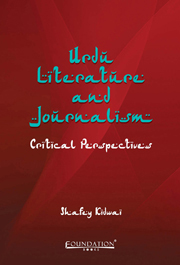Book contents
- Frontmatter
- Dedication
- Contents
- Preface
- Introduction
- Acknowledgements
- 1 Post-Independence Urdu Short Story
- 2 Post-Partition Urdu Poetry
- 3 Structuralism and Post-structuralism in Urdu Criticism
- 4 Jayant Parmar
- 5 Firaq as a Critic
- 6 Ghalib Criticism
- 7 Literature, Culture and Social Consciousness
- 8 The Influence of Tagore on Urdu Literature
- 9 Early Journalistic Endeavours of Sir Syed Ahmad Khan
- 10 Pioneering the First Urdu Book on Journalism
- 11 The Contribution of Urdu Journalists to the First War of Independence
- 12 Abul Kalam Azad's Journalistic Conquests
- Index
1 - Post-Independence Urdu Short Story
The Indian Perspective
Published online by Cambridge University Press: 05 October 2014
- Frontmatter
- Dedication
- Contents
- Preface
- Introduction
- Acknowledgements
- 1 Post-Independence Urdu Short Story
- 2 Post-Partition Urdu Poetry
- 3 Structuralism and Post-structuralism in Urdu Criticism
- 4 Jayant Parmar
- 5 Firaq as a Critic
- 6 Ghalib Criticism
- 7 Literature, Culture and Social Consciousness
- 8 The Influence of Tagore on Urdu Literature
- 9 Early Journalistic Endeavours of Sir Syed Ahmad Khan
- 10 Pioneering the First Urdu Book on Journalism
- 11 The Contribution of Urdu Journalists to the First War of Independence
- 12 Abul Kalam Azad's Journalistic Conquests
- Index
Summary
Since the short story, unlike poetry, frequently unfolds the humdrum of daily domesticity, it has been perceived as a body of writing that hardly transcends the common place experiences of life. Short story, by its very nature, zeroes in on a reality that is not only multidimensional and far more pernicious but also has an unpredictable element that shapes our day-to-day life. In line with its above-mentioned defining theme, the short story also turns our attention to some eternal verities that constitute the mainstay of human existence.
It tries to highlight the wholeness and richness of an experience in its entirety by presenting things in diverse perspectives. Set in both urban and rural milieu, stories unfailingly form a template for coming to terms with external reality, and the trials and tribulations of the characters pave the way for self-discovery. The characters unfold themselves in dribs and drabs and one can also come across a plethora of protagonists whose actions are both self-revelatory and self-concealing. They show tacit support for lifelong rectitude.
Urdu short story, right from the beginning, reflected its immense zest in focussing on ‘shimmerness of life’, a phrase frequently used by D. H. Lawrence. Pandit Ratan Nath Sarshar, Nazeer Ahmad and Mirza Hadi Ruswa laid the foundation of Urdu fiction and they depicted the multifaceted reality of life with rare dexterity.
- Type
- Chapter
- Information
- Urdu Literature and JournalismCritical Perspectives, pp. 1 - 33Publisher: Foundation BooksPrint publication year: 2014

